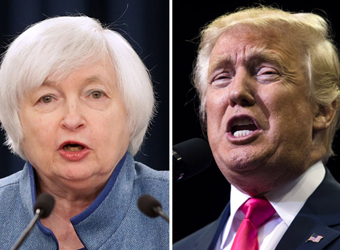A week ago, all looked well in the world of the Federal Reserve and Chair Janet Yellen: Economic hopes were high, the markets were performing well, and the central bank was well on its way to restoring some sense of normalcy after a decade of historically loose monetary policy.
Suddenly, things have gotten murkier.
The stock market just turned in its worst one-day performance of the year, worries are escalating in Washington and on Wall Street that President Donald Trump’s agenda has hit stall speed, and the notion that the Fed will have a free ride seems considerably less certain.
Should this keep up, and there’s a growing drumbeat on the Street that it will, at least in the near term, it could set up Trump and Yellen on a collision course.
“The different perspectives of Chairwoman Yellen and President Trump further underscore the potential for a future collision, rather than productive collaboration,” Michael Arone, chief investment strategist at State Street Global Advisors, said in a note.
Indeed, tightening monetary policy against fiscal gridlock does not paint a pretty picture.
The markets had been looking for real progress from Trump’s promises on tax reform and regulatory rollbacks. The uncertain fate of this week’s health-care vote has thrown into question the administration’s ability to get the rest of its agenda implemented in a timely fashion.
While the market shrugged off the March 15 Fed interest rate increase, in anticipation of Trump-spurred economic growth, it might not have quite as strong an appetite for the two more hikes central bank officials have indicated they will approve this year.
“There’s a real policy timing mismatch here,” Arone said. “Yellen is moving the ball down the court, while Trump still has failed to put the ball in play.”
Market action since the rate hike, coincidental or not, hasn’t been pleasant.
Following a rally the day of the Fed’s move, stocks have been lower since.
Tuesday’s washout contributed strongly to a week that had the S&P 500 lower by 1.75 percent as of Wednesday afternoon.
The decline has come as market watchers question whether the aggressive ten percent post-election rally needs to catch its breath.
Valuations looked stretched, with the index trading at more than 18 times forward earnings.
Enthusiasm over Trump had been able to forestall valuation concerns. A defeat on health care could reverse market sentiment in a hurry.
“The market has embraced the Trump agenda through thick and thin,” said Quincy Krosby, market strategist at Prudential Financial.
“Anything that looks as if that may be delayed or watered-down or that he is not the great negotiator that he campaigned on has an extended, overbought market questioning whether or not valuations at this point are correct.”
That leaves the Fed in a potentially uncomfortable spot.
A week ago, investors believed and embraced the concept that the Fed could and would raise rates a total of three times this year.
However, just a few market undulations have lowered that conviction, to the point where traders assigned just a 53 percent chance by Wednesday afternoon that a third increase could come by December. Earlier in the day, that probability actually fell below 50 percent.
“We are so used to a market that has been underpinned by accommodative monetary policy,” Krosby said.
“We have gotten away from what markets are supposed to do. They are supposed to recalibrate, take time, burn out froth and wait for the next catalyst to push the market higher.”
In fact, David Rosenberg, senior economist and strategist at Gluskin Sheff, told clients that he’d feel more comfortable if the market did pull back to reflect the fundamentals of a 2 percent growth economy more closely.
“My recommendation is to stop wasting your time trying to explain something that is as simple as an asset class that is priced for perfection at some points realizes that the world is not a perfect place,” he said.
“A president can certainly fly a drone whenever and wherever he wants, but he is never bigger than the business cycle and over time has little influence over investment returns as well,” he concluded.
Source: CNBC
